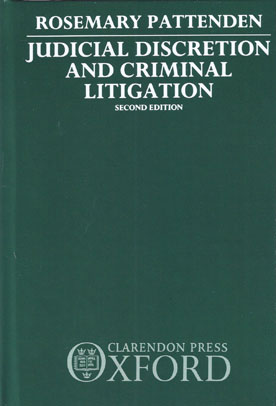
This book is about the discretions exercised by criminal trial courts both at Crown Court and Magistrates' Court level and about discretion in the criminal appellate process. The aim is twofold. First, to provide a theoretical framework within which to discuss and assess the discretions.
This entails defining discretion, outlining the reasons for the existence of discretion and considering the means by which discretion may be controlled. Secondly, to examine the evidential and procedural discretions whose existence is recorded in cases, statutes, and the reports of law bodies, and to list the known principles by which these discretions should be exercised.
The text concentrates on the law and practice in England and Wales but the footnotes include extensive references to the decisions and statutes of Australia, Canada and New Zealand. The last chapter of the book examines the way in which an exercise of discretion by a trial court, the Court of Appeal, or the Divisional Court of the Queen's Bench Division may be challenged and demonstrates that whatever the position may have been at the turn of the century few erroneous exercises of discretion are now inviolable.